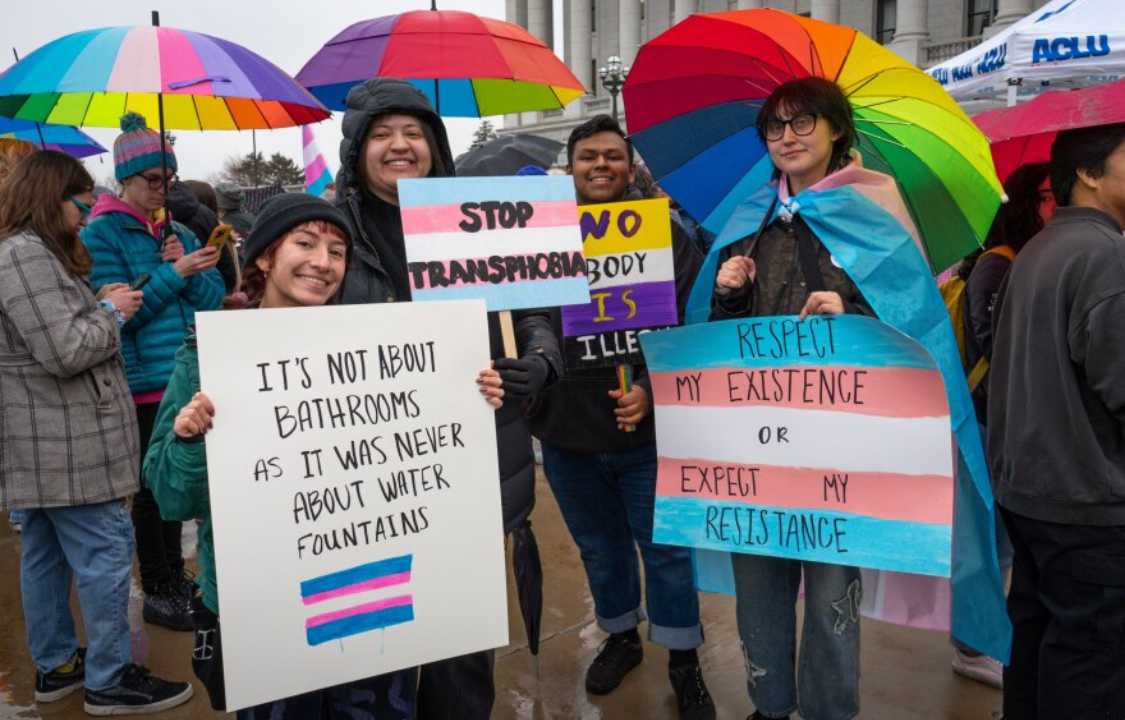
A bill that limits the use of restrooms and locker areas for trans people in “publicly owned and controlled” buildings was revised by the Utah Senate.
The floor sponsor of HB257, Republican Sen. Dan McCay, introduced a substitute on January 24 that loosened restrictions on which transgender people may use public restrooms. The restrictions appeared to be reinstated in the initial version of the bill when he proposed another substitute the following morning. In Utah law, it also defines what a man, woman, women, and men are. The Senate version allows transgender people to use the restroom they desire in domestic violence and homeless shelters, in contrast to the version that was approved by the House on January 19.
On the floor, McCay emphasized once more that the bill focuses more on inappropriate behavior of people in private areas like restrooms and locker rooms than it does on gender identity. He claimed that adding the gender designation back into the bill would “protect personal privacy.”
To argue for the need for sex-designated separation in publicly owned spaces and changing areas, McCay also reviewed a list of incidents from various states of persons sexually assaulting women and children in public restrooms.
He claimed that these were actual incidents with actual problems involving the wrong identity in the wrong bathroom. “I’m done with it; I have four daughters.”
None of the cases featured transgender people, and Republican Rep. Daniel Thatcher, one of his colleagues, emphasized this. Although Thatcher acknowledged the issue of physical violence in Utah, he added that “making a ban against transgender persons, is not targeting the actions.”
He even brought up concerns with validity.
According to Thatcher, “It is against the Equal Protection Clause of the United States Constitution when we treat transgender people differently under the law.”
Thatcher thanked McCay for initially loosening the bill’s restrictions to focus on the actions of a bathroom user. With these innovative modifications, he completely changed his support.
All Senate Democrats voted against the updated bill, including Thatcher and Republican Sen. Todd Weiler.
 Toddler’s, David/KUER
Toddler’s, David/KUERProtesters raised their banner on the steps of the Utah State Capitol in Salt Lake City in opposition to HB257, a trans bathroom access bill that the Senate took up on January 25, 2024.
According to McCay, a transgender person will not be subject to criminal penalties for using the restroom that is consistent with their gender identity, but they will be if they are “engaged in naughtiness” or engage in other illegal behavior.
What exactly qualifies as a “publicly owned and controlled” facility is also up for debate. It’s unclear if this policy may apply to places like the Salt Lake City International Airport, even though the bill makes it clear that folks use a sex-designated restroom in state recreation centers and public libraries.
A sex-designated locker room or changing room that is appropriate for trans people’s gender identity would not be permitted under the bill. For instance, it would be against the law for a trans woman to use the women’s locker room in the regional recreation center.
Transgender kids in public K–12 schools are also subject to restroom restrictions. A transgender student would be required to create a “privacy plan” with the school, and administrators would have to give that student access to single occupancy or faculty stalls if they didn’t want to use the restroom that matches the sex that was assigned to them at birth.
 Collins, Sean/KUER
Collins, Sean/KUERSenate Minority Leader Luz Escamilla addresses the media in the Utah State Capitol on January 25, 2024. After the Senate passed two bills restricting transgender access to public services and banning DEI offices from public universities, K–12 schools, and government agencies, Escamilla and the Democratic House and Senate caucuses wore black in support of the country’s majority and LGBTQ+ populations.
The only way a trans person can use the restroom that matches their gender identity is if they have gender-affirming surgeries and updated their birth certificate. This exemption also applies to K–12 students, who are prohibited from having gender-affirming surgery after the Government outlawed it for minors last year.
Democrats from the House and Senate addressed both of the controversial bills passed by the Senate—the bathroom bill and another that targets diversity, equity, and inclusion programs in schools—donning all-black as a symbol of “mourning” during the news conference.
“To support and safeguard our marginalized and vulnerable populations, we did band together. We will only go forward as a result of these bills. We’re not progressing,” said Luz Escamilla, the president of the Senate Minority.
Liberals promised to support Gov. Spencer Cox to veto the bills. The governor’s office declined to comment on whether Cox intends to sign or veto the bill when it arrives at his office, according to KUER.



